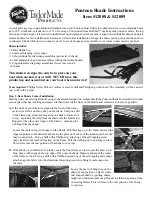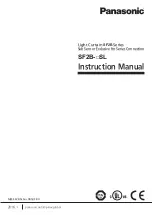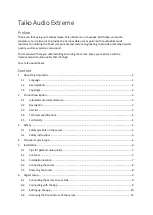
Mounting
Continued on the following page.
c
Standard Land Dimensions
c
Notice (Soldering and Mounting)
a
c
Solder Resist
(in mm)
b
Land
Chip
Part Number
Soldering
Methods
Chip (L
g
W)
a
Dimensions (mm)
b
c
1.6
g
0.8
Reflow Soldering
Reflow Soldering
0.6-0.8 0.6-0.7 0.6-0.8
1.0
g
0.5
Reflow Soldering
0.5
0.4-0.5
0.5
2.0
g
1.25
1.0-1.2 0.5-0.7 1.0-1.2
PRG15
PRG18
PRG21
To remove the flux after soldering, observe the following
points in order to avoid deterioration of the characteristics
or any change to the external electrodes' quality.
2-propanol
Less than 5 minutes
at room temp.
or
Less than 2 minutes
at 40˚C max.
Less than 1 minute
20W/L Frequency
of several 10kHz
to 100kHz.
Solvent
Dipping Cleaning
Ultrasonic Cleaning
A sufficient cleaning should be applied to remove flux completely.
(1) Printing Conditions of Solder Paste
(a) Standard thickness of solder paste printing should
be from 0.15 to 0.20mm.
(b) After soldering, the solder fillet should be a height
from 0.2mm to the thickness of this product (see the
figure at right).
(c) Too much solder result in excessive mechanical
stress to this product. Such stress may cause
cracking or other mechanical damage. Also, it can
destroy the electrical performance of this product.
In your mounting process, observe the following points in
order to avoid deterioration of the characteristics or
destruction of this product. The mounting quality of this
product may also be affected by the mounting conditions,
shown in the points below.
This product is for reflow soldering only. Flow soldering
should not be allowed.
0.2mm
V
T
V
E
T
Solder
Solder
Electrode
1. Solder and Flux
2. Cleaning Conditions
3. Soldering Conditions
(1) Solder Paste
Use solder paste Sn:Pb=63:37wt%.
For your reference, we are using
63Sn/37Pb RMA9086 90-3-M18,
manufactured by Alpha Metals Japan Ltd.
96.5Sn/3.0Ag/0.5Cu
M705-GRN360-K2-V,
manufactured by Senju Metal Industry Co., LTD for any
internal tests of this product.
(2) Flux
Use rosin type flux in the soldering process.
If the flux below is used, some problems might be
caused in the product characteristics and reliability.
Please do not use these types of flux.
s3TRONGACIDICFLUXWITHHALIDECONTENTEXCEEDING
0.2wt%).
s7ATERSOLUBLEFLUX
(*Water-soluble flux can be defined as non-rosin type
flux including wash-type flux and non-wash-type flux.)
E
After cleaning,
promptly dry
this product.
Drying




















